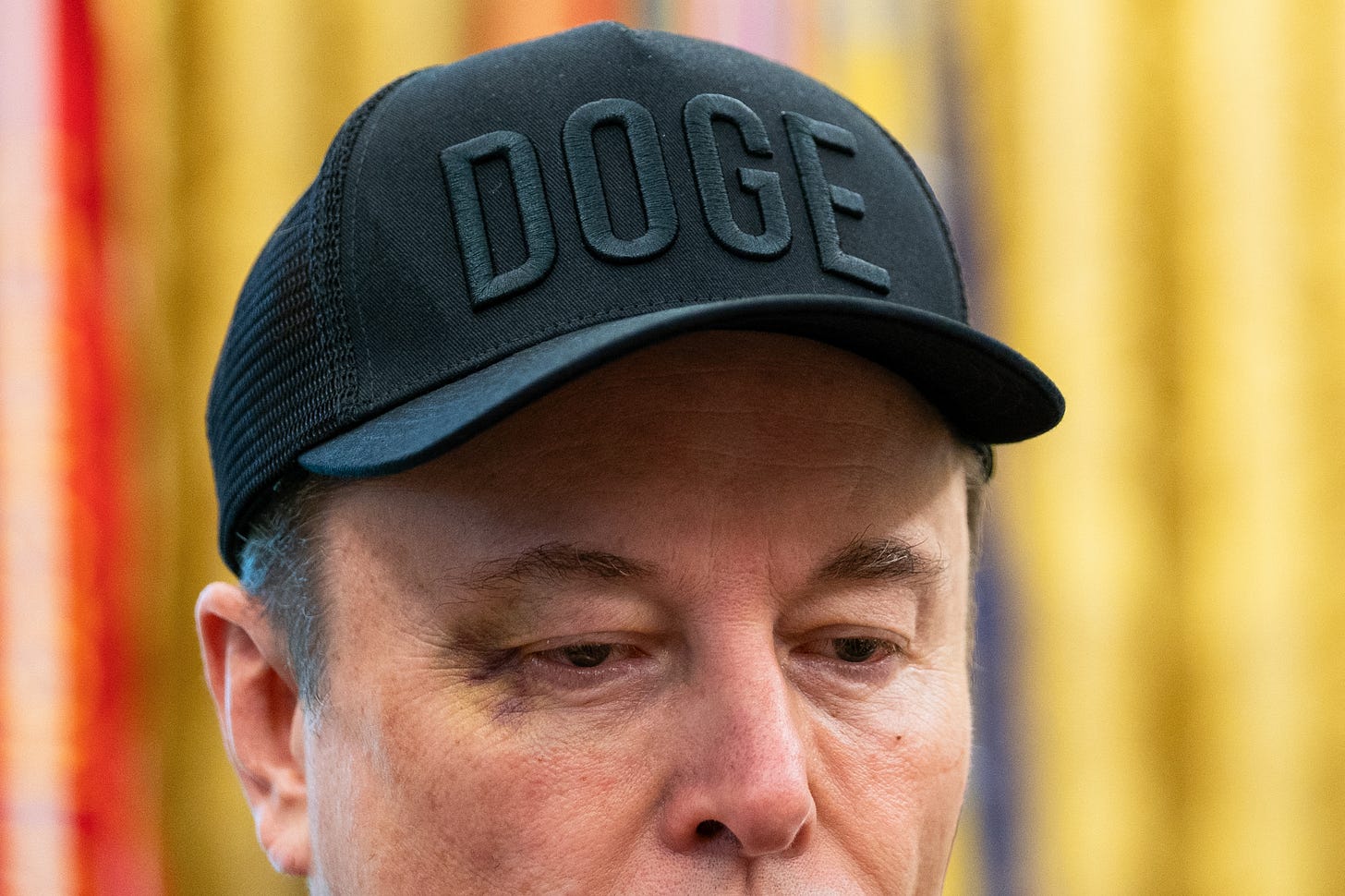Tesla Takedown takes down Musk
Protest works.

🚙 💨 This edition of PN is made possible by paid subscribers. If you appreciate our fiercely independent coverage of American politics, please support our work by clicking the button and signing up for a paid subscription. 🚙 💨
Last week, billionaire and onetime unofficial co-president Elon Musk ended his tenure as a special government employee after four months of spreading chaos, misery, and death throughout the federal government and world.
Much reporting has attributed his departure to philosophical differences with President Trump. Musk has criticized various Trump policies, most recently the House GOP spending bill for adding trillions to the federal deficit. But a crucial factor in Musk’s departure has been the grassroots protest that has damaged Musk’s businesses and helped destroy his popularity.
Musk remains very powerful and may well continue to serve in an advisory role for Trump even if he’s more behind the scenes. But his retreat and obvious wish to distance himself from a government role he initially relished demonstrates that organized resistance can damage even the wealthiest man on earth.
Opposing Musk
Musk spent some $250 million on Trump’s campaign in 2024. As a quid pro quo, he was put in charge of the so-called Department of Government Efficiency (DOGE), with a remit to cut federal spending and line his pockets by hoovering up even more lucrative government contracts for his companies.
Though DOGE has no real authority from Congress, its personnel — mostly Musk’s employees and loyalists who go by monikers like “Big Balls” — were given sweeping (and unconstitutional) permission by Trump to freeze congressionally appropriated funds. DOGE is believed to have fired more than 200,000 federal employees.
As one example of its overreach, DOGE recklessly cut resources at the National Oceanic and Atmospheric Administration, gutting US forecasting abilities, with possibly devastating consequences for predicting future weather emergencies. More, last week one researcher discovered that DOGE’s cuts to USAID have probably already killed 300,000 people, most of them children. An estimate by Nature suggests that DOGE cuts to foreign aid could kill 21 million people over 15 years.
Even if you set aside the horrific death toll and judge DOGE strictly on its own supposed goals, it seems likely that the whole lawless, cruel exercise will cost more than it saved.
There have been numerous lawsuits to attempt to stop Musk’s reckless attack on the government and Constitution. A suit by several Democratic state attorneys to declare the whole enterprise illegal moved forward last week. The US Institute of Peace — an independent agency established by Congress — won a lawsuit regaining control over its own building which DOGE had illegally taken over. There are ongoing negotiations and lawsuits over DOGE’s (terrifying) access to sensitive financial data.
The fight in the courts is important. But arguably the most immediate and effective pushback against Musk has been from activists, organizers, and individuals focusing on his electric vehicle company Tesla.
A note from Aaron: Working with brilliant contributors like Noah takes resources. If you aren’t already a paid subscriber, please sign up to support our work.
Soon after Musk joined the Trump administration, a decentralized protest movement known as Tesla Takedown began staging nonviolent protests across the country. A major event at the end of March included protests in 253 cities, in the US and abroad.
Individuals have also expressed their anger at Musk by targeting his company and those who buy its products. One recent study by Guardian Service found that 46 percent of Tesla owners said that their cars have been vandalized, and 43 percent said they’d seen “rude gestures or negative comments from strangers while behind the wheel.”
These incidents aren’t necessarily violent or all that damaging — political columnist Chris Cillizza reported with some outrage that someone had “defaced” his Tesla by leaving a sticker on his car saying “Musk is a Nazi.” But the cumulative effect is to make Tesla ownership toxic. The Guardian Service study found that a third of Tesla owners were considering selling their cars within a year.
Tesla 📉
The backlash against Tesla has badly damaged the company’s business fortunes. In April the stock was down a stunning 40 percent from the beginning of the year. Its sales that month were down 49 percent in Europe from April 2024 — this despite a surge in sales for electric vehicles on the continent. In the first quarter of 2025, Tesla vehicle deliveries were down 13 percent from the previous year — even worse than the company’s already low estimates. The company showed a 71 percent drop in profits.
Tesla’s board is famously subservient and unwilling to reign in Musk; one board director is his brother, and another has vacationed with his family. But the company is in such dire straits that that there are signs of rebellion. Investors have demanded that the board force Musk to work at the company at least 40 hours a week. They’ve also called for a succession plan.
It’s difficult to gauge Musk’s motivations — his public statements are often not candid, and reports of his extensive drug use suggest that his decisions may be erratic at the best of times. But it seems clear that the harm to his reputation and to his company has affected him. Much of his personal fortune is in Tesla stock; at the low point he was estimated to have lost $80 billion. Perhaps that’s why he seemed on the verge of tears in one Fox Business interview when he was asked how he was running his other businesses while at the White House. (“With great difficulty” he sighed — watch below.)
Musk’s decision to distance himself from the Trump administration is a transparent exercise in damage control. So is his claim that he will be spending less in elections going forward — though that may also reflect his embarrassing defeat in the April Wisconsin Supreme Court race where he spent $21 million to elect a candidate who lost by 10 points.
Can everyone beat one billionaire?
Musk arguably was a liability in the Wisconsin Supreme Court race; Democrats highlighted his spending and ran against him personally because he’s so thoroughly disliked.
This unpopularity is new. Musk was touted for years as a genius and an aspirational figure. He was even the inspiration for the Marvel Cinematic Universe’s Iron Man, one of the most beloved pop culture figures of the last 20 years. But recent polls show Musk with only about a 33 percent approval rating — a significant decline even from December of last year, when it was 41 percent. When asked about his influence in Washington, 65 percent of adults said he has too much power — including even 37 percent of Republicans.
Musk’s strategic retreat from a high profile government role obviously does not mean that he has been defeated forever. Tesla stock is up somewhat on news that he’s going to be focusing more on the company, and in any even he remains repulsively wealthy. His retainers in DOGE continue to slither around in the federal government looking for people to hurt, and he clearly retains great power and influence. He can and will continue to cause harm whether or not he’s actually making Nazi salutes at presidential events.
But while Musk isn’t vanquished for all time, it’s important to recognize that he has, in at least a limited way, suffered a defeat. He paid for Trump’s presidency in the hope that he could rule the world and the government unimpeded. And instead he met impediments — from the courts, from activists, from voters, from the public. Musk’s reputation is in tatters; so is his car company. That isn’t justice and it isn’t victory. But it’s a reminder that billionaires are not all powerful, and that resistance isn’t futile.
That’s it for today
We’ll be back with more tomorrow. If you appreciate today’s newsletter, please support our work by signing up. Paid subscribers make Public Notice possible.
Thanks for reading, and for your support.






Don’t take your eye off the ball. Peter Theil is stepping in and he’s far more dangerous that the erratic Ketamine huffer.
Treating Musk stepping down as a PR move is missing the point, I think. Its one driver, sure, but it seems to me Musk is stepping because he's achieved what he wanted to - shut down, derail or defang any and all investigation against him and his companies by federal government authorities. From the EPA, to US Aid to the Consumer Bureau, he's systematically targeted and removed these, all while hoovering up data for his own benefit.
Like, sure, he's finally been pressured to leave, but let's not pretend its because he didn't have more to do ..